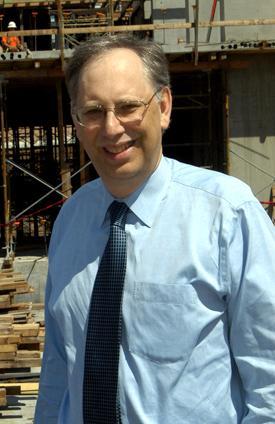
 |
|
A Sense of Entitlement
When It Comes to City Approvals, Developers Call Land Use Ace Craig Lawson by Kathryn Maese LA Downtown News, April 11, 2005 By most accounts, the field of land use feasibility analysis is about as sexy as a turnip. Craig Lawson knows it too, but somehow he has managed to parlay his services into one of the hottest commodities Downtown.  Lawson doesn't advertise, but more business comes his way than his team can handle. The name of his Culver City-based company, Craig Lawson & Co., is passed along largely through word of mouth, via the network of high-powered dealers who know he can help make their multi-million dollar developments materialize. Within the last year alone, the company has guided more than 1,500 housing units through the city's complex entitlement process, helping both experienced and novice investors avoid pitfalls that could imperil a high-rise condo tower or affordable housing project. In the South Park district, where the bulk of the company's endeavors are springing up, Lawson and his seven-person team are shepherding a significant portion of the area's housing growth, particularly in the booming condo industry. During lunch at a trendy Japanese restaurant in the historic Helms Bakery, where his office is headquartered, Lawson points to a map where entire blocks of housing and commercial projects are planned. His company is working on all of them. "Everyone is assuming that the LA Live project will get built," Lawson said, referring to the $1 billion entertainment district planned next to Staples Center. "The excitement it will bring to South Park makes it natural to have some really good residential in that area." In recent years, the area around Staples Center has exploded with residential, fueled in part by low interest rates, a citywide housing shortage and speculation about the neighborhood's comeback. As a result, much of the company's business has shifted east to Downtown Los Angeles. Along with South Park, the firm is active in the Arts and Industrial districts, as well as nearby Lincoln Heights, where 311 units of affordable housing are being built. Craig Lawson & Co.'s clients, at least the ones he is allowed to discuss publicly, include: the 250-unit condo tower at 1010 Wilshire; the 95-unit Molino Lofts, set to open soon; the South Group's 223-condo tower called Luma, as well as another tower the company is planning; 90 condos at the converted Library Court at Sixth and Hope streets; the 196-unit San Lucas Apartments for seniors; and the 156-unit Hanover Apartments that will include a restaurant and retail stores. The latter project, on the block bounded by Ninth, Figueroa, Olympic and Flower, is one of several developments on the parcel on which Lawson is consulting. The block includes the Variety Arts Building, and is set to feature a mixed-use housing project by a local tenant that has yet to be announced. "They've handled some of the biggest projects Downtown," said Emily Gabel Luddy, a Planning Department official who has worked with Lawson. "The city's regulatory environment has gotten so complex, it's essential that developers who are going to invest hundreds of millions of dollars in projects work with representatives such as Lawson's group who are familiar with the city processes and customer service." Code Talkers Lawson's team specializes in sorting through the morass of city processes and lingo that baffle most laymen. His job is to assess a property's potential, such as whether the zoning code allows for high-rise or mid-rise, whether the building must be set back from the street, or how much open space is required. When a client wants to go beyond the boundaries and challenge city rules - and most do - the company's expertise comes into play. Behind the Scenes Lawson is no stranger to planning and politicking, a fact that has helped him in his current venture. He has built a powerful network of connections during his 28-year career, which started in 1977 when he began a decade-long stint advising late Mayor Tom Bradley on urban planning, transportation policy and economic development. He was also Bradley's liaison to the 1984 Los Angeles Olympic Organizing Committee, an event that later gave L.A. the impetus to encourage more tourism by implementing public improvements such as the expansion of the Convention Center. In 1989 Lawson was appointed to help manage and finance the $500 million expansion project, a complex undertaking that further honed his expertise in navigating city channels. Contact Kathryn Maese at kathryn@downtownnews.com. photo by Gary Leonard |
|
|
RETURN TO HOMEPAGE |
Return to News Articles |